| Date |
Information |
|
| 24/05/2018 |
Lieutenant Colonel J Lenox- Conyngham, who has been appointed to the command of the new 6th Service Battalion of the Connaught Rangers, now quartered at Fermoy, is the third son of the late Sir W F Lenox- Conyngham, K.C.B., D.L., of Springhill, Moneymore. He entered the army in January 1881, at twenty years of age, and joined the Connaught Rangers, to which regiment his father had belonged. He was in India for nine years, part of which time he spent on the Sikkim Frontier. He was distinguished as a horse man and a polo player, and was most popular with his men. Subsequently he served in Malta and Cyprus, and from 1897 to 1902 he filled the post of Adjutant of the 4th Connaught Rangers Militia, when it was embodied during the Boer War. In 1900 he was promoted Major, and in 1910 Lieutenant Colonel in command of the 2nd Battalion of the Connaught Rangers. In 1911 he retired, and has resided in Dublin till recalled to the flag. |
| 24/05/2018 |
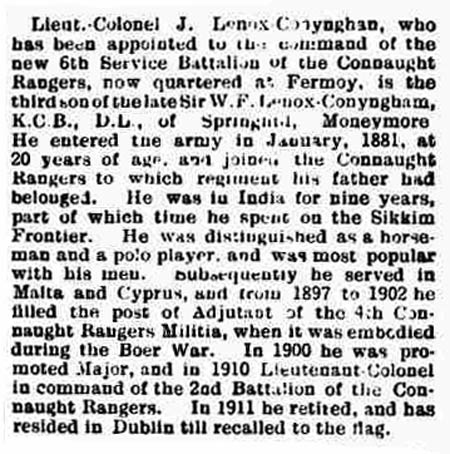 |
| 24/05/2018 |
From the Mid Ulster Mail dated 31st October 1914: |
| 27/03/2017 |
General List – Major W A Lenox-Conyngham, from R.D.C., to be major, for duty at a record office, and retains his seniority, 6th February 1918. |
| 27/03/2017 |
 |
| 27/03/2017 |
From the Belfast Newsletter dated 18th March 1918: Territorial Force |
| 08/01/2017 |
Lieutenant Colonel W A Lenox-Conyngham, Royal Welsh Fusiliers, of Spring Hill, Moneymore, is appointed to a command in the Territorial Force Reserve. |
| 08/01/2017 |
 |
| 08/01/2017 |
From the Belfast Newsletter dated 7th November 1916: Lieutenant Colonel W A Lenox-Conyngham (brother of John S M Lenox-Conyngham) |
| 07/01/2017 |
At an adjourned quarterly meeting of Londonderry County Council, held in Coleraine on Saturday, the chairman (Mr J E O’Neill, J.P.) proposed a vote of sympathy with Colonel J J Clark, H.M.L., the chairman of the council, on the death in action in France of his brother-in-law, Lieutenant Colonel- John Staples Molesworth Lenox-Conyngham. Mr J A long, J.P., seconded the motion, which was supported by Messrs H E Thompson and R L Millen, and passed, the members standing. Mr Barrie associated himself with the remarks that had fallen from Mr O’Neill regarding the death of Lieutenant Lenox-Conyngham, who was a member of a family held in a position of honour and universal respect in their county. The Conyngham family was one of which County Derry had every right to feel proud, and the services rendered to the country by the members of it in the Great War in which the country is engaged had added new reasons for that pride. |
| 07/01/2017 |
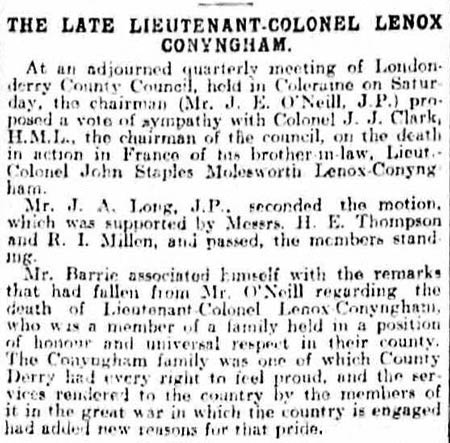 |
| 07/01/2017 |
From the Belfast Newsletter dated 23rd October 1916: The Late Lieutenant Colonel Lenox-Conyngham |
| 02/01/2017 |
At Moneymore Petty Sessions yesterday, before Mr W Q Murphy, R.M., and seven other magistrates, Mr William Ekin, J.P., proposed a vote of condolence with their frequent chairman, Major W A Lenox-Conyngham, D.L., on the death of his brother, Lieutenant Colonel John Lenox-Conyngham, who had recently been killed in the war. Also with their present chairman, Mr W Q Murphy, B.L., R.M., whose brother, Dr Murphy, has died on active service. The resolution was passed by a standing vote. Mr Murphy, R.M., said he joined in the condolence regarding the late Lieutenant Colonel Conyngham, and thanked the magistrates for their kind reference to the death of his own brother. |
| 02/01/2017 |
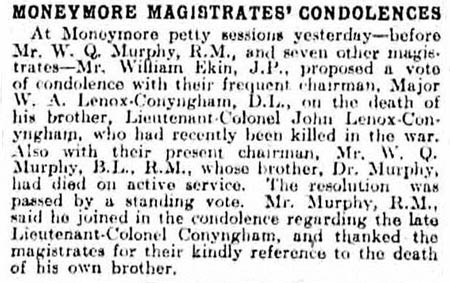 |
| 02/01/2017 |
From the Belfast Newsletter dated 4th October 1916: Moneymore Magistrates’ Condolence |
| 30/12/2016 |
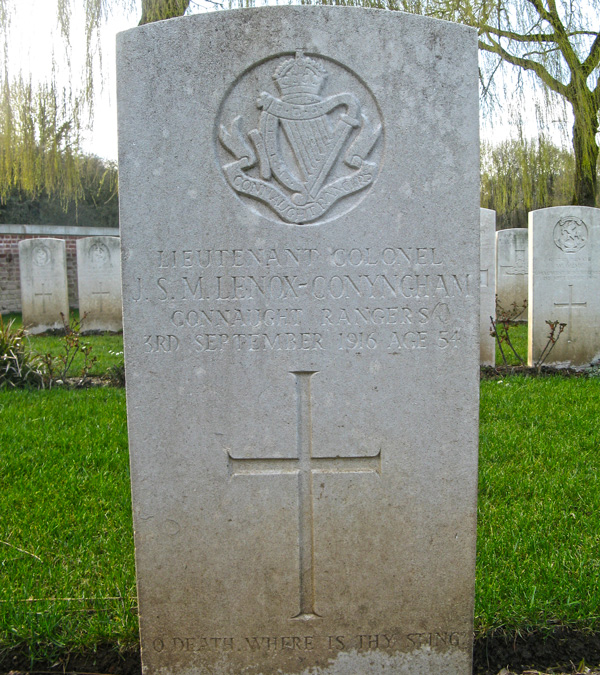 |
| 30/12/2016 |
Lieutenant Colonel John Staples Molesworth Lenox-Conyngham is buried in Carnoy Military Cemetery, France. |
| 30/12/2016 |
‘When the word to advance was given our battalion of the Connaught Rangers were where they had earned the right to be, in the foremost line, and the man who gave the word was the man who had made them what they were, worthy inheritors of a famous name. First out of the trench and waving them on, Colonel John Lenox-Conyngham saw them launched and he saw no more. A bullet took him in the forehead. I do not know what finer thing could have been desired for him. His work was accomplished. The battalion he had trained led the rush which swept through Guillemont that day, and on the next captured Ginchy. The men, the men – It was always the men with him; it had to be with us also. That was at the root of the process by which a first rate professional soldier taught willing amateurs how to train troops. It was more difficult in our case because three or four of us junior officers were nearly of his own age (he was fifty-five) and would in ordinary life have met him on an entire equity. I was the nearest to him in age, yet I was never in life so much in awe of any man. I never valued praise so much from any, and was never so unresentful under reproof. And reproof was never spared if there was negligence. But no professional was ever more tolerant of the amateur or more appreciative of his difficulties. ‘I am asking men with six months experience to take complete charge of a company, when in the Regular Army they would not have been allowed to handle it for ten minutes on parade.’ That, in effect, he said to me over and over again. I remember many days in France when the company commanders were brought together because some compliment was paid to him, and he could not be content till, with a frank generosity, he had passed it on to his officers. ‘It was you who have done it,’ he said. He was right too. We did the work and no men were ever less interfered with; but we did it as we have been taught to do it, and we were kept up to it at every point. There was another side of him that came out, though sparingly, in the comradeship of our mess - a rare quality of charm. I found it myself most in his occasional talk of men and things, above all of Ireland. I have known no better Irishman than this son of an Ulster house whose kindred were deep in the Ulster Covenant. For this outward appearance, if words can give the impression of something extraordinarily tall, thin and upright, yet without stiffness and with an easy poise, that was he. Always ‘point device’, he seemed to have been born in uniform. Horseback became him, but I remember him best on foot, and for his most characteristic movement. I recall the grave dignity of his salute as he rendered it for some general officer. For the regiment what had most vitality was his voice; it carried like a trumpet, and had the beauty as well as power. I should not be surprised if through all the din of that fierce hour the battalion heard it down the assembly trench when he raised it for the last time to launch the charge on Guillemont.’ |
| 30/12/2016 |
He was seen carrying his walking stick in one hand and his revolver in the other. |
| 30/12/2016 |
The Battalion was posted to France in December 1915. |
| 30/12/2016 |
Captain Stephen Gwynn M.P., in the course of an appreciation in the Daily Mail of Colonel John S M Lenox-Conyngham, a member of a well-known County Derry family, killed in action, writes:- |
| 30/12/2016 |
 |
| 30/12/2016 |
From the Belfast Newsletter dated 27th September 1916: The Late Colonel Lenox-Conyngham – Tribute by Captain Stephen Gwynn M.P. |
| 23/09/2016 |
Lieutenant Colonel Gerald Ponsonby Lenox-Conyngham, Royal Engineers, who has been promoted to the rank of colonel, is the fifth son of the late Sir William Fitzwilliam Lenox-Conyngham, K.C.B., D.L., of Spring Hill, Moneymore, County Londonderry. He married in 1890, Elsie Margaret, daughter of Surgeon General Bradshaw, C.B. |
| 23/09/2016 |
From the Belfast Newsletter dated 23rd October 1915: Lieut-Col G P Lenox-Conyngham (brother of J S M Lenox-Conyngham) |
| 23/09/2016 |
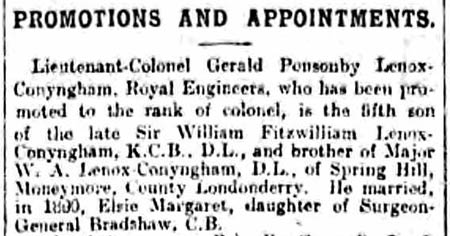 |
| 08/07/2016 |
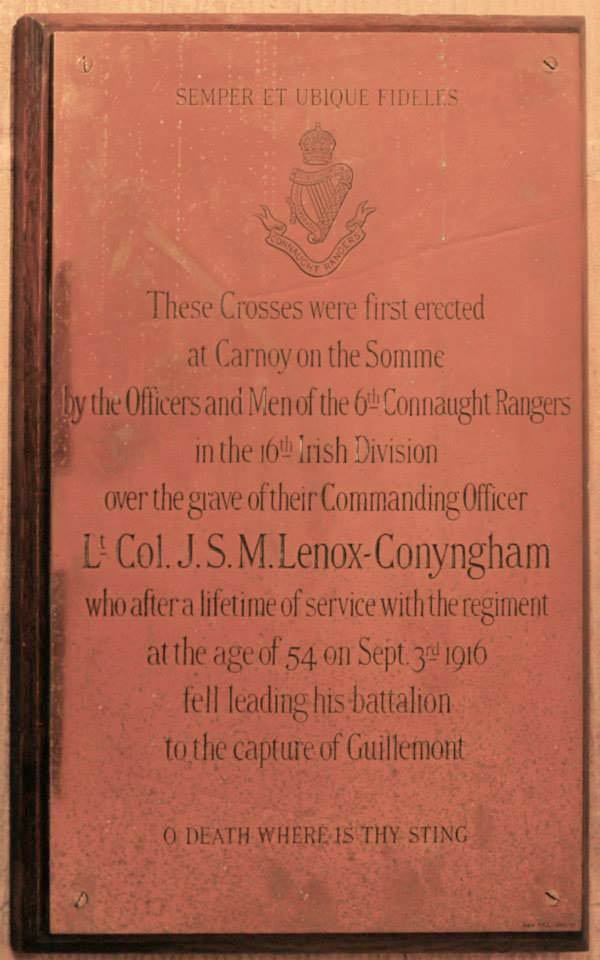 |
| 08/07/2016 |
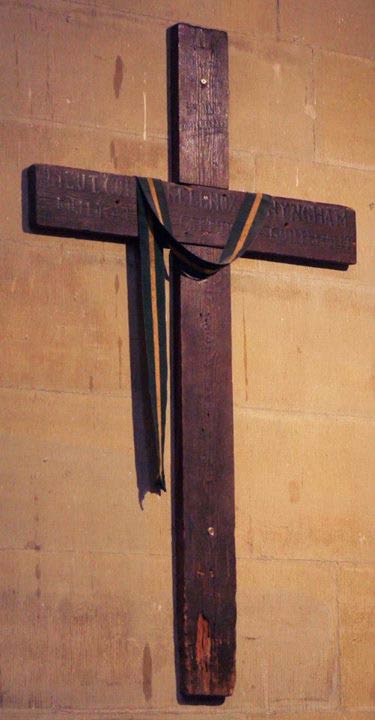 |
| 08/07/2016 |
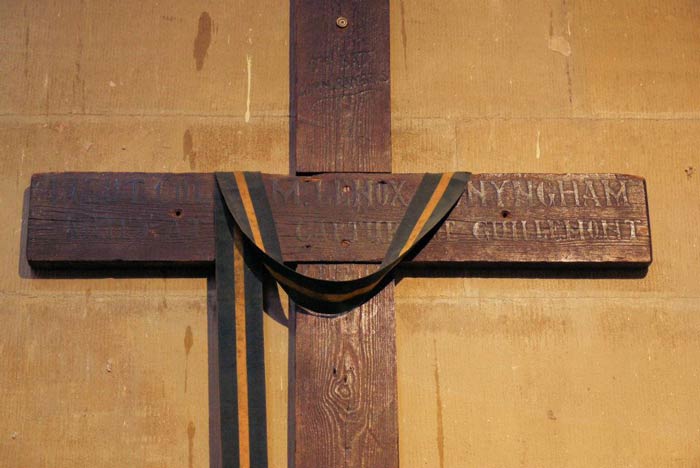 |
| 08/07/2016 |
‘These Crosses were first erected at Carnoy on the Somme by the Officers and Men of the 6th Connaught Rangers in the 16th Irish Division over the grave of their Commanding Officer Lt. Col. J. S. M. Lenox-Conyngham who after a lifetime of service with the regiment at the age of 54 on Sept. 3rd 1916 fell leading his battalion
to the capture of Guillemont. O DEATH WHERE IS THY STING’ |
| 08/07/2016 |
There is also a memorial plaque in St. Patrick's Cathedral, Armagh. It reads:- |
| 08/07/2016 |
J S M Lenox-Conyngham is also commemorated in St. Patrick's Cathedral, Armagh with his original wooden grave marker from Carnoy. |
| 30/12/2015 |
From the Mid Ulster Mail dated Saturday 3rd June 1916: Major William Arbuthnot Lenox-Conyngham (brother of John S M Lenox-Conyngham) |
| 30/12/2015 |
His brother, Lieutenant Colonel W.A. Lenox-Conyngham (a veteran of the Boer War), served throughout the First World War with the Worcestershire Regiment and the Carnarvon and Anglesey Territorial Battalion of Welsh Fusiliers. |
| 30/12/2015 |
Another brother, Colonel G.P. Lenox-Conyngham, served throughout the war with the Royal Engineers. |
| 30/12/2015 |
His brother, Lieutenant Colonel Herbert Lenox-Conyngham, served with the Army Veterinary Corps. |
| 30/12/2015 |
His nephew, Lieutenant Commander J. Lenox-Conyngham Clark, served with the Royal Navy and received a D.S.O. in recognition for his services with a destroyer flotilla in operations at the Dardenelles, during the Gallipoli Campaign. |
| 30/12/2015 |
In just over one week’s fighting on the Somme, the 6th Connaught Rangers had lost 23 Officers and 407 other ranks. The battalion would go on to fight throughout the rest of the war, and was almost annihilated during the German breakthrough at St. Emilie, in March 1918 |
| 30/12/2015 |
John Staples Molesworth Lenox-Conyngham was educated at Fettes College, Edinburgh, Midlothian, Scotland |
| 30/12/2015 |
On two occasions while the Battalion were in training at Fermoy, County Cork and again at Blackdown, Hampshire, he personally received Mr. Joseph Devlin, M.P. At the outbreak of the First World War, Joe Devlin had actively supported and encouraged men of the National Volunteers to enlist for service. Many of these men were working class Nationalists from West Belfast who went on to join the 6th Connaught Rangers. |
| 30/12/2015 |
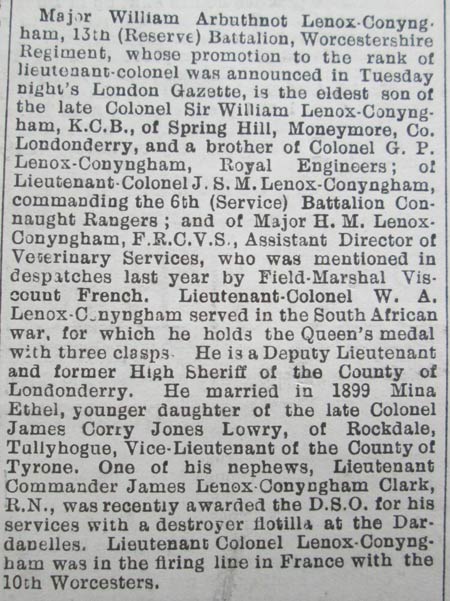 |
| 30/12/2015 |
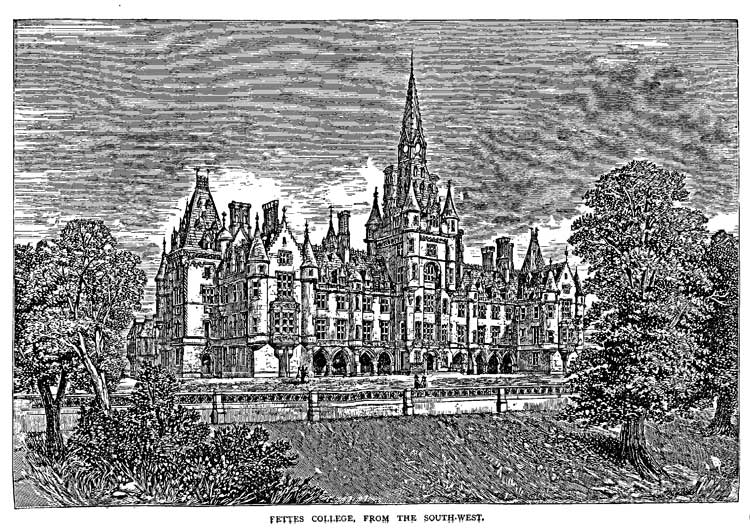 |
| 30/12/2015 |
J.S.M. Lenox-Coyngham is commemorated on Moneymore War Memorial (Assembly Rooms) and on Coagh War Memorial (Royal British Legion Cookstown). |
| 30/12/2015 |
“No Commanding Officer was more beloved by those he commanded and I have known no better Irishman than this son of an Ulster House, whose kindred was deep in the Ulster Covenant. “ |
| 30/12/2015 |
Lieutenant Colonel John Staples Molesworth Lenox-Conyngham was killed in action on 3rd September 1916 as he led his men in North Street, Guillemont, during the Battle of Guillemont. |
| 30/12/2015 |
At the out break of the First World War he promptly returned to his old regiment and was immediately gazetted as Commanding Officer of the 6th Battalion Connaught Rangers, a new volunteer Battalion, which was formed at Kilworth, County Cork in September 1914, and assigned to 47th Brigade, 16th Irish Division. |
| 30/12/2015 |
He attained a field rank in July 1900, and was appointed second in command of the 2nd Battalion Connaught Rangers in February 1906. He retired from the Army on half pay in January 1912 |
| 30/12/2015 |
He was married to Miss Violet Donaldson, second daughter of Henry Beveridge Donaldson of Melbourne, in 1891. |
| 30/12/2015 |
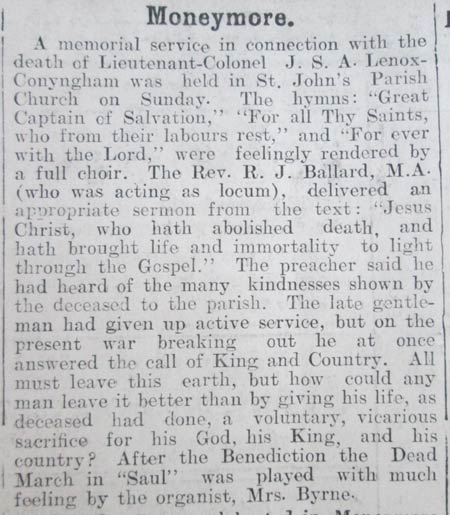 |
| 30/12/2015 |
John S.M. Lenox-Conyngham joined the army in January 1881 and got his promotion soon after. He served with the 1st and 2nd Battalions of the Connaught Rangers, and was promoted again to the rank of Captain in 1889. |
| 30/12/2015 |
Major William Arbuthnot Lenox-Conyngham, 13th (Reserve) Battalion, Worcestershire Regiment, whose promotion to the rank of lieutenant colonel was announced in Tuesday’s London Gazette, is the eldest son of the late Colonel Sir William Lenox-Conyngham, K.C.B., of Spring Hill, Moneymore, County Londonderry, and a brother of Colonel G P Lenox-Conyngham, Royal Engineers; of Lieutenant J S M Lenox-Conyngham, commanding the 6th (Service) Battalion Connaught Rangers; and of Major H M Lenox-Conyngham, F.R.C.V.S., Assistant Director of Veterinary Services, who was mentioned in despatches last year by Field Marshall Viscount French. Lieutenant W A Lenox-Conyngham served in the South African war, for which he holds the Queen’s Medal with three clasps. He is Deputy Lieutenant and former High Sheriff of the County of Londonderry. He married in 1899, Mina Ethel, younger daughter of the late Colonel James Corry Jones Lowry, of Rockdale, Tullyhogue, Vice-Lieutenant of the County of Tyrone. One of his nephews, Lieutenant Commander James Lenox-Conyngham Clark, R.N., was recently awarded the D.S.O. for his services with a destroyer flotilla at the Dardanelles. Lieutenant colonel Lenox-Conyngham was in the firing line in France with the 10th Worcesters. |
| 30/12/2015 |
He is remembered as a deeply caring Officer, the welfare of his men being of great concern to him. Fellow officers remembered him dispersing them all to the cook house to ensure the men were served first. His death cut across the political divide in Ireland. Stephen Gwynne, a Captain in the 6th Connaughts, and a Nationalist M.P. at the time stated: |
| 30/12/2015 |
From the Mid Ulster Mail dated Saturday 16th September 1916: |
| 30/12/2015 |
A memorial service in connection with the death of Lieutenant Colonel J S M Lenox-Conyngham was held in St John’s Parish Church on Sunday. The hymns: ‘Great Captain of Salvation’, ‘For all Thy Saints, Who From Their Labours Rest’ and ‘For Ever With the Lord’ were feelingly rendered by a full choir. The Rev R J Ballard, M.A., who was acting in locum, delivered an appropriate sermon from the text: ‘Jesus Christ, who has abolished death, and hath brought life and immortality to light through the Gospel.’ The preacher said he had heard of the many kindnesses shown by the deceased to the parish. The late gentleman had given up active service, but on the present war breaking out he at once answered the call of King and Country. All must leave this earth, but how could any man leave it better than by giving his lie, as the deceased had done, a voluntary vicarious sacrifice for his God, his King, and his country? After the Benediction the Dead March in ‘Saul’ was plated with much feeling by the organist, Mrs Byrne. |
| 30/12/2015 |
From the Mid Ulster Mail dated Saturday 23rd September 1916: Moneymore |
| 30/12/2015 |
John Staples Molesworth Lenox-Conyngham was the third son of Sir William F. Lenox-Conyngham K.C.B. of Springhill House, Moneymore. |
| 30/12/2015 |
 |
| 30/12/2015 |
From the Mid Ulster Mail dated Saturday 16th September 1916: |
| 30/12/2015 |
At a special meeting of the Queen Mary Guild (Falls and Smithfield Wards), Belfast, a vote of deepest sympathy with Mrs Colonel Lenox-Conyngham on the great loss she has sustained by the death in action of Colonel Lenox-Conyngham, and also of condolence with the men of the Connaught Rangers on being deprived of their commander, was passed in silence. This Branch of the Guild quite recent received a letter from the late Col. Lenox-Conyngham expressing hearty thanks for gifts for the men, whom he wrote of in terms of the highest praise. |
| 30/12/2015 |
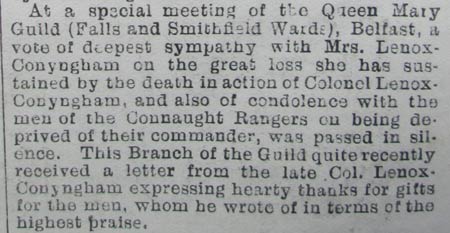 |
| 30/12/2015 |
From the Mid Ulster Mail dated Saturday 16th September 1916: |
| 30/12/2015 |
Widespread regret was felt by people of all creeds at the sad news of the death of Lieutenant Colonel J S M Lenox-Conyngham, killed in action in France on the 3rd September. The deceased is a brother of Mrs J J Clark, Lurgantogher House. |
| 30/12/2015 |
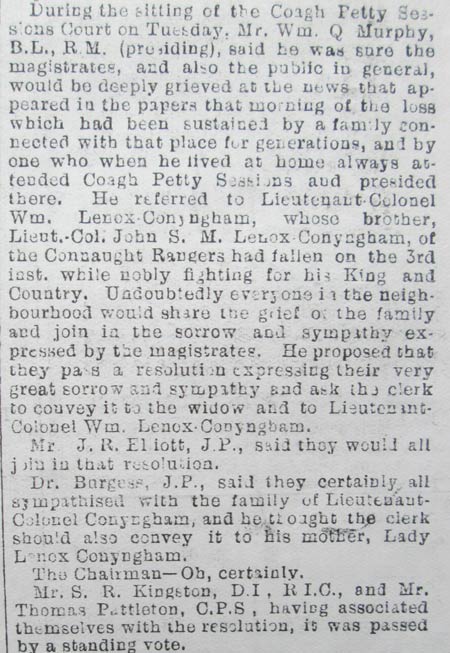 |
| 30/12/2015 |
From the Mid Ulster Mail dated Saturday 16th September 1916: Lieutenant Colonel John Staples Molesworth Lenox-Conyngham |
| 30/12/2015 |
Lieutenant Colonel J S M Lenox Conyngham married in 1891 Violet, second daughter of the late Mr Henry Beveridge Donaldson, of Melbourne. The Lenox Conyngham family is descended from William Cunningham, a Scottish Protestant, who settled in the townland of Ballindrum, in which Springhill is situated, in 1609, and from James Lenox, M.P. for Derry, who won distinction at the siege of that city. |
| 30/12/2015 |
One of the deceased nephews, Lieutenant Commander J Lenox Conyngham Clark, R.N., was appointed a Companion of the Distinguished Service Order in recognition of his services with a destroyer flotilla during the memorable operations of the Dardanelles. |
| 30/12/2015 |
Lieutenant Colonel H M Lenox Conyngham, F.R.C.V.S., Army Veterinary Corps, who was mentioned in despatches last year by Field Marshall Viscount French. |
| 30/12/2015 |
Colonel G P Lenox Conyngham, Royal Engineers |
| 30/12/2015 |
Lieutenant Colonel W A Lenox-Conyngham of Springhill, Moneymore, who, at the beginning of the present war, was at the front with the Worcester Regiment, and is now temporarily commanding a Carnarvon and Anglesey Territorial Battalion, Welsh Fusiliers, and who also served in the South African War |
| 30/12/2015 |
The deceased was the third son of Sir William F Lenox Conyngham, K.C.B., who held a commission in the Connaught Rangers, and on retiring from the army was given the command of the Londonderry Militia, which he held for 36 years. He had also been High Sherriff of the County of Londonderry. The late Lieutenant Colonel Lenox-Conyngham, who was in his 55th year, entered the army in January 1881, and obtained his step six months later, and was promoted to the rank of captain in December 1889. He attained field rank in July 1900, and was appointed second in command of his battalion – the second Connaught Rangers - in February 1906. He retired on half-pay in January 1912, but promptly volunteered for service on the opening of the present war, being gazetted commanding officer of the 6th Service Battalion of his old regiment, and was exceeding popular amongst the troops under him. On two occasions, at Fermoy in the early part of 1915 and at Blacktown later in the same year, He personally received and welcomed Mr Joseph Devlin, M.P., who visited the men of the Brigade. He was one of four brothers serving, the others being:- |
| 30/12/2015 |
Lieutenant Colonel John Staples Molesworth Lenox-Conyngham, Connaught Rangers who was killed in action on 3rd September, was a member of the well-known County Derry family which has settled at Springhill, Moneymore, since the beginning of the 17th century, and who has in every generation since, one or more of their number in military life. William Conyngham of Springhill, who was born about 1650, commanded a company of dragoons in the war between King William III and King James II, and he was granted in 1688 a commission by the first named monarch. Another distinguished member of the family was Colonel Albert Conyngham, ‘an illustrious knight of the Royal Army grieved for the cause of liberty’, who raised at his own expense, the Inniskilling Dragoons, and fought at the Boyne. He fell for his country in 1691. Colonel George Conyngham, who succeeded to Springhill in 1721, commanded a corps. His son, William Conyngham, born in 1723, fought with distinction in the wars against Germany in the middle of the eighteenth century, and commanded the fourth regiment of horse. His journal, written during that campaign, is preserved at Springhill. George Lenox Conyngham of Springhill, born in 1752 (with Mr Connolly of Cliff), raised the County Derry Regiment of Volunteers in 1782. |
| 30/12/2015 |
 |
| 30/12/2015 |
During the sitting of the Coagh Petty Sessions Court on Tuesday, Mr William Q Murphy, B.L., R.M. (presiding), said he was sure the magistrates , and also the public in general, would be deeply grieved at the news that appeared in the papers that morning of the loss which had been sustained by a family connected with that place for generations, and by one who when he lived at home always attended Coagh Petty Sessions and presided there. He referred to Lieutenant Colonel William Lenox-Conyngham, whose brother Lieutenant Colonel J S M Lenox-Conyngham, of the Connaught Rangers had fallen on 3rd September while nobly fighting for his King and country. Undoubtedly everyone in the neighbourhood would share the grief of the family and join in the sorrow and sympathy expressed by the magistrates. He proposed that they pass a resolution expressing their very great sorrow and sympathy and ask the clerk to convey it to the widow and to Lieutenant Colonel Lenox-Conyngham. Mr J R Elliott, J.P., said they would all join in that resolution. Dr Burgess, J.P., said they certainly all sympathised with the family of Lieutenant Colonel Lenox-Conyngham, and he though the clerk should also convey it to his mother, Lady Lenox-Conyngham. The Chairman – Oh certainly. Mr R S Kingston, D.I., R.I.C., and Mrs Thomas Pattleton, C.P.S., having associated themselves with the resolution, it was passed by a standing vote. |